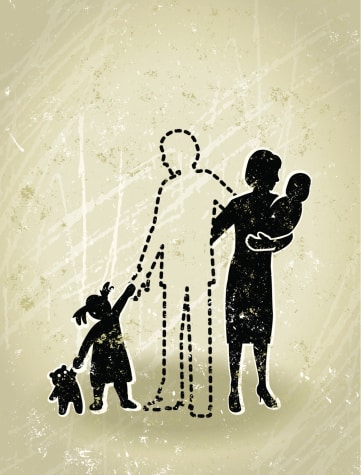
(For the audio version of this blog, please visit: http://brothersinchristcmf.org/wp-content/uploads/2023/03/Mass-Blog-for-the-Third-Sunday-of-Lent-2023.mp3)
Recently The Wall Street Journal published a page-long article on kids killing kids (Juvenile Crime Surges, Reversing Decline). It quoted several experts blaming the pandemic’s elimination of “routine” in kids’ lives. These experts also cited easy access to guns and entrapment in “social” media’s solitary confinement. But this article failed to address the only divinely-inspired remedy: easier access to dads and moms.
In fact the primary use of the word “family” in this article is its application to “family courts”—not the kind of family God intended to teach kids right from wrong. This tells us that the legal system, advocacy groups and law enforcement have become the de facto families of too many children. Fathers are absent, both from these families and from the list of solutions “experts” like to ponder.
This contrasts with ancient times when the preservation of families and the role of the father—both an earthly one and the heavenly one—were linked to survival. Moses felt this burning desire as he fathered his people out of slavery under Egypt’s attempts to replace their fathers with masters. But the deeper they got into the desert, the further away from the meager sustenance by which Egyptian government kept them enslaved. Sounds rather modern-day, doesn’t it? Sunday’s first reading (Ex 17:3-7) demonstrates how easily we can be enslaved by fear when our faith flags.
In their thirst for water, the people grumbled against Moses, saying, “Why did you ever make us leave Egypt? Was it just to have us die here of thirst with our children and our livestock?” So Moses cried out to the LORD, “What shall I do with this people? … The LORD answered Moses, … “I will be standing there in front of you on the rock in Horeb. Strike the rock, and the water will flow from it for the people to drink.” … The place was called Massah and Meribah, because the Israelites quarreled there and tested the LORD, saying, “Is the LORD in our midst or not?”
The answer is YES, even in our modern society’s faith deserts. But the deaths happening in them are caused by ignorance of the only death guaranteed to save lives. As Paul explains in Sunday’s second reading (Rom 5:1-2, 5-8),
Christ, while we were still helpless, died at the appointed time for the ungodly. Indeed, only with difficulty does one die for a just person, though perhaps for a good person one might even find courage to die. But God proves his love for us in that while we were still sinners Christ died for us.
Today the ungodly and unparented are dying for nobody and nothing. Many are children, as disrespected and uncounseled as the Samaritans were in Jesus’s day. What could be worse than a Samaritan at that time?
How about a Samaritan woman who couldn’t have children.
Unlike today, children of ancient times were seen as a family’s way out of slavery. In Sunday’s gospel reading (Jn 4:5-42), Jesus meets a Samaritan woman sitting at a well. His request for water leads to one of the longest counseling sessions Jesus ever had with anyone in the gospels. He knew this woman had been abandoned by five husbands and was angling for a sixth. Many gospel scholars believe she ran through husbands like water through a faucet because she couldn’t give them children. Jesus knew what she needed was a Father.
“The hour is coming, and is now here, when true worshipers will worship the Father in Spirit and truth; and indeed the Father seeks such people to worship him. God is Spirit, and those who worship him must worship in Spirit and truth.”
Jesus’s insights into this woman’s life, and his promise of the life-giving water of his Father’s truth, converted her from childless reject to daughter and disciple. The new life she inherited that day is still available to us from the same bottomless well. Its truth will set all captives free—even the abandoned children among us who are enslaved by this world’s increasingly solitary confinements.
–Tom Andel